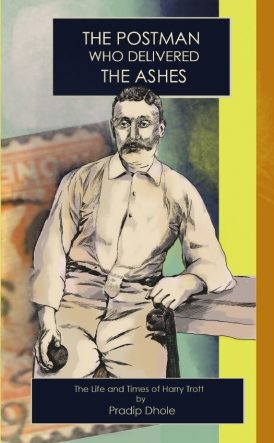The Postman Who Delivered The Ashes
Martin Chandler |Published: 2022
Pages: 268
Author: Dhole, Pradip
Publisher: CricketMASH
Rating: 3 stars

This one is Pradip Dhole’s second book and, like the first, it is about an Australian cricketer from the Victorian era. The subject of the first, Billy Midwinter, had not been the subject of any previous biographical work and for that reason alone was a worthy addition to the literature of the game. Harry Trott, on the other hand was, with younger brother Albert, the subject of Rick Smith’s 2010 book Blighted Lives.
A cricketer, or anyone else for that matter, being the subject of one book is not of itself any reason for a second not being worthwhile. Indeed Trott Junior was the subject of an excellent second book in 2017, Over and Out by Steve Neal. One difference between that one and The Postman Who Delivered The Ashes is that Steve Neal’s list of sources did list Blighted Lives. Oddly Dhole’s does not.
As Australian captain Trott was highly regarded. Primarily a batsman his record in that respect is useful rather than spectacular, a career average at Test level of 21.92 being pretty ordinary even at that time. At Test level Trott could not be considered a genuine all-rounder, but he was still a useful leg spinner who took 29 wickets in his 24 Tests.
Outside of cricket Trott’s career was not a stellar one, as the title of Dhole’s book indicates, and other than cricketing issues his life steered a path free of very much that was controversial until, approaching his 32nd birthday his health, both mental and physical, broke down. Trott recovered sufficiently to play a few more First Class matches, his final appearance coming as a 41 year old against the MCC tourists of 1907/08.
The Postman Who Delivered The Ashes begins with a chapter dealing with the background of the Trott family, and concludes with one looking at the sad decline, but that apart the book is not really a biography, a message I suspect was intended to be conveyed by the fact that that word is not used in the title, Dhole using the expression life and times in his sub title, something that is certainly dealt with.
The bulk of the book would perhaps be better styled as a history of the Ashes over the period of Trott’s Test career which, whilst it may have lasted only ten years, was made up of as many as seven series. By way of example Chapter 6 of the book takes up more than a fifth of the book, dealing as it does with the first truly memorable Test series, that of 1894/95. As a summary of that series Dhole’s effort is a good one, but anyone reading the chapter in isolation would not conclude that the extract came from a biography on Harry Trott.
The following chapter contains what I initially thought was a revelation, and then concluded was a mistake before, at the third time of reading and checking realised was just an unfortunate misunderstanding. At first blush I thought Dhole was telling me that Trott was, through peer pressure, removed from the 1896 party selected to England. The confusion came in a couple of pages later when, as I had always believed to be the case, Trott was later chosen by his teammates to captain the side.
What I couldn’t find on my second read through the chapter was the point at which Trott was reinstated, or an answer to the follow up question of how the team could want him out, and then want him to lead them. It was only after a third read and then consulting another book that I realised that the Harry who was removed was not Harry Trott, but a fellow Victorian, Jack Harry. It was, perhaps, an inevitable misunderstanding, albeit one that could have been avoided.
Another lengthy chapter then follows on the 1897/98 England tourists. Almost the same length as that on the 1894/95 series once again it is a chronicle of the series as much as Trott’s role in it. There is however the revelation here that I briefly thought I had discovered in Chapter 7. Had I read of it previously I am sure I would have remembered that at the time of the tour a law was proposed in New South Wales regarding the imposition of what Dhole describes a deterrent tax, being a charge imposed on any non-white person entering the state. The charge was a significant one, the equivalent of more than £10,000 today and would have caught Ranji. It is not something I can readily see mentioned in any of the several biographical works I have on the Jam Sahib, and I would have been interested to learn more.
One thing that has to be said is that The Postman Who Delivered The Ashes is an excellent title for a book, and it is perhaps inevitable that the content does not quite match, but this is still a well written account of the early cricketing contests between England and Australia. There is a decent statistical appendix marred a little for older readers by its having a very small font, and there is a decent index. The photographs in the book would, ideally, have been reproduced in a rather larger size, but there is an excellent portrait of Trott on the front cover which, to my mind at least, perfectly captures the personality of the man.






Leave a comment